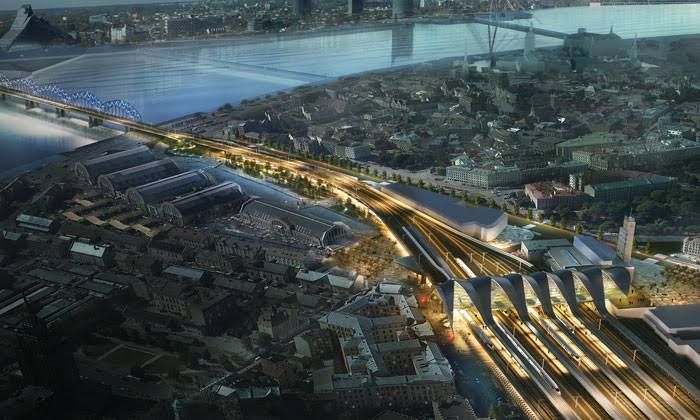Rail Baltica project in Estonia: Overview and Private Sector Involvement
Rail Baltica is a European Union-funded project aimed at building a high-speed railway connection between the Baltic States and the rest of the European Union. The railway line will connect Tallinn in Estonia, Riga in Latvia, and Vilnius in Lithuania, as well as providing a direct link to Poland and

Rail Baltica is a European Union-funded project aimed at building a high-speed railway connection between the Baltic States and the rest of the European Union. The railway line will connect Tallinn in Estonia, Riga in Latvia, and Vilnius in Lithuania, as well as providing a direct link to Poland and the rest of the EU.
In Estonia, the Rail Baltica project involves the construction of a new railway line from Tallinn to the Estonian-Latvian border. The project also includes the development of several new railway stations, including one in Tallinn and others in the cities of Pärnu and Rapla.
The Rail Baltica project in Estonia is being led by the Estonian state-owned railway infrastructure company, Rail Baltic Estonia. The company is responsible for the planning, design, construction, and operation of the railway line and related infrastructure.
One of the main challenges facing the Rail Baltica project in Estonia is the environmental impact of the construction work. The railway line will cross several protected areas, including the Natura 2000 network, which is designed to protect Europe's most valuable and threatened species and habitats. As a result, environmental impact assessments and mitigation measures are being implemented to minimize the project's impact on these areas.
In terms of recent developments, construction work on the Rail Baltica project in Estonia began in 2020. The first phase of construction involves the construction of a 210 km section of the railway line between Tallinn and the Estonian-Latvian border. The project is expected to be completed by 2026.
In addition, the Estonian government recently announced plans to establish a new Rail Baltica development center in Tallinn. The center will be responsible for coordinating the various stakeholders involved in the project, including the Estonian government, local municipalities, and private sector companies.
Overall, the Rail Baltica project in Estonia is an ambitious and complex undertaking, aimed at improving transport connections between the Baltic States and the rest of the European Union. While there are challenges and environmental concerns, the project is moving forward and is expected to be a significant driver of economic growth and development in the region.
Rail Baltic Estonia is a state-owned company, fully owned by the Republic of Estonia. Its primary mission is to implement the Rail Baltica project in Estonia and develop a sustainable and modern rail infrastructure in the country.
As for the Rail Baltica development center in Tallinn, the Estonian government announced its plans to establish the center in late 2020. The center will serve as a central hub for coordinating and managing the Rail Baltica project in Estonia, and will bring together all key stakeholders, including representatives from the government, local municipalities, and private sector companies.
The main objective of the development center is to ensure that the Rail Baltica project is implemented efficiently and effectively, and that all stakeholders are working together in a coordinated and collaborative manner. The center will be responsible for managing the project timeline, budget, and risk, as well as ensuring that the project is aligned with the strategic goals and objectives of the Estonian government.
The development center will also play a key role in promoting the Rail Baltica project and raising awareness of its benefits among the public and private sector stakeholders. This will involve engaging with local communities, organizing public events and seminars, and developing communication and marketing materials.
Overall, the establishment of the Rail Baltica development center in Tallinn is an important step forward in the implementation of the Rail Baltica project in Estonia. It will help to ensure that the project is delivered on time, on budget, and to the highest possible standards, and that it delivers maximum economic, social, and environmental benefits to the people of Estonia and the wider Baltic region.
The Rail Baltica development center in Tallinn is being established by the Estonian government, in partnership with Rail Baltic Estonia, the state-owned company responsible for implementing the Rail Baltica project in Estonia. The center will be jointly operated by the Estonian Ministry of Economic Affairs and Communications and Rail Baltic Estonia.
In addition, the development center will work closely with other stakeholders involved in the Rail Baltica project in Estonia, including local municipalities, private sector companies, and international partners such as the European Union and the other Baltic States (Latvia and Lithuania). The center will serve as a hub for coordinating and aligning the efforts of all these stakeholders, with the goal of delivering a successful and sustainable Rail Baltica project in Estonia.
There are several private sector companies involved in the Rail Baltica project in Estonia. These companies are mainly involved in the construction and engineering aspects of the project, and are responsible for delivering specific components or sections of the railway line and related infrastructure.
Some of the key private sector companies involved in the Rail Baltica project in Estonia include:
- AS Merko Ehitus Eesti - a leading construction company in Estonia, responsible for the construction of the Pärnu railway station and the Pärnu bypass road.
- Sweco Projekt AS - a multidisciplinary engineering and consulting company, responsible for the design of the railway line and related infrastructure, as well as the environmental impact assessments.
- Rail Road Systems UAB - a Lithuanian company specializing in railway construction, responsible for the construction of the railway line between the Estonian-Latvian border and Pärnu.
- Leonhard Weiss RTE AS - a German engineering company, responsible for the construction of the railway line between Tallinn and the Estonian-Latvian border.
- Telia Eesti AS - an Estonian telecommunications company, responsible for providing the digital infrastructure for the Rail Baltica project, including the communication and control systems for the railway line.
These private sector companies are working closely with Rail Baltic Estonia and other stakeholders to ensure that the Rail Baltica project in Estonia is delivered on time, on budget, and to the highest possible standards.




